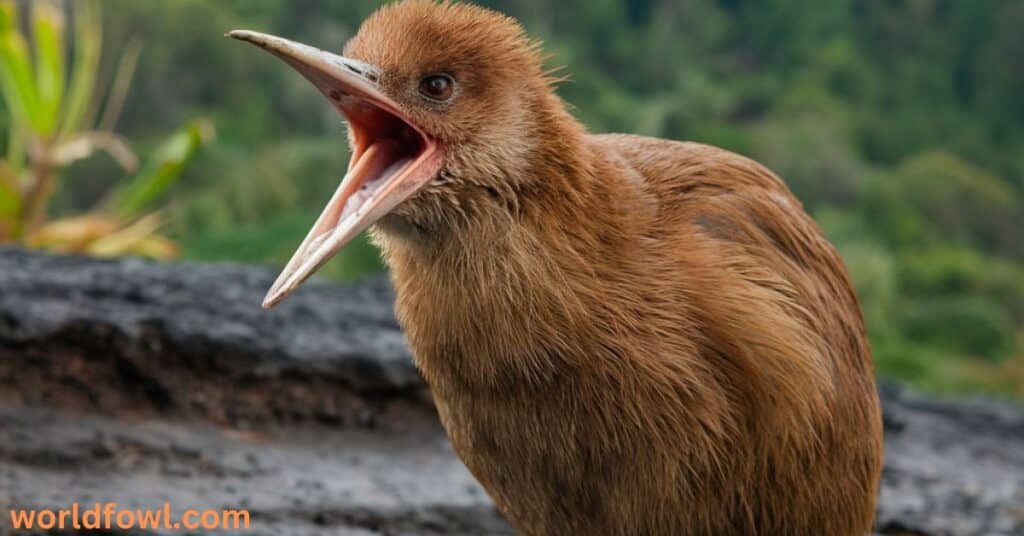The kiwi bird, often seen as a symbol of New Zealand, has fascinated wildlife enthusiasts, birdwatchers, and ecologists alike. These flightless, nocturnal creatures are a rare and unique example of nature’s diversity. But for many, the question remains: Do kiwi birds attack humans? Given their small size, peculiar appearance, and elusive behavior, it’s easy to misinterpret their actions. Are they aggressive? Or do they prefer a more solitary and non-confrontational lifestyle?
This in-depth exploration will delve into the true nature of kiwi birds, examining their behavior, defense mechanisms, interactions with humans, and their crucial role in New Zealand’s ecosystem. We will also separate fact from fiction, addressing common myths about these fascinating creatures. From understanding their behavioral traits to recognizing their importance in wildlife conservation, this guide will offer a comprehensive overview of kiwi birds and help answer the age-old question: Do kiwi birds attack humans?
What Are Kiwi Birds?
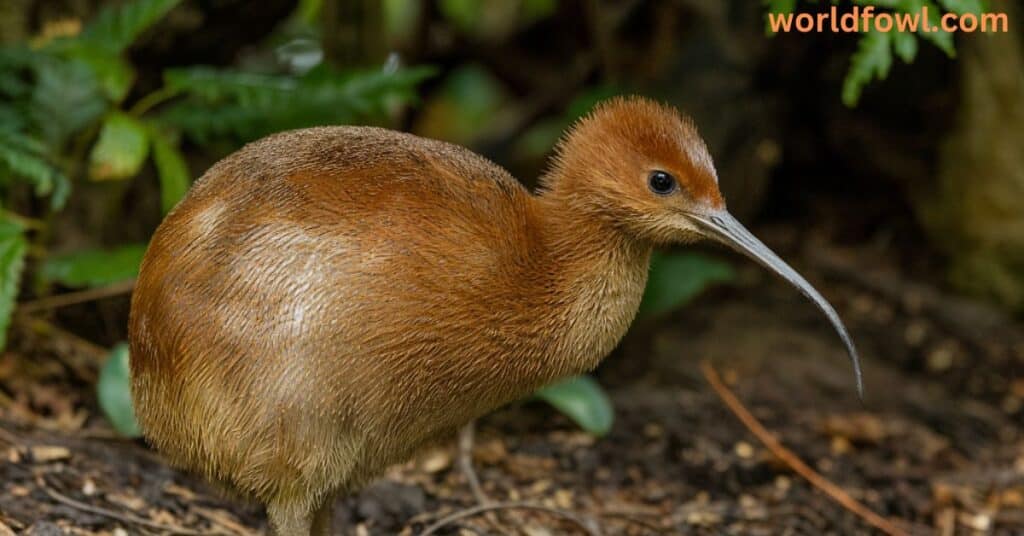
Before answering the question of whether kiwi birds are aggressive or pose a threat to humans, it’s important to fully understand what these remarkable creatures are. Kiwi birds, scientifically known as Apteryx, are native to New Zealand. These flightless birds are small, nocturnal, and belong to an ancient group of birds called the ratites, which includes other flightless birds like ostriches, emus, and rheas. However, the kiwi bird is truly one of a kind.
Kiwi Bird Characteristics
- Size and Shape: Kiwi birds are roughly the size of a chicken, with a round body, long legs, and a small, pointed beak. Unlike most birds, they have very small wings that cannot be used for flight, making them fully flightless birds. Despite their small size, kiwi birds are strong and capable of running quickly when necessary.
- Feathers and Appearance: Kiwi birds have unique feathers that resemble fur more than the typical feathers of other birds. Their plumage is brown and fibrous, providing excellent camouflage on the forest floor. These birds also have large, sensitive nostrils located at the tip of their long beaks, which allow them to smell out food in the dark.
- Nocturnal Behavior: Kiwi birds are primarily active at night, foraging for food under the cover of darkness. As nocturnal creatures, they have developed excellent night vision and heightened senses, especially their sense of smell, which helps them locate insects, worms, fruits, and other food sources.
- Flightless: As mentioned, kiwi birds cannot fly. Their wings are very small and vestigial, serving no functional purpose in flight. Instead, their primary mode of movement is running or walking through dense forest floors and tall grasslands, using their powerful legs.
- Endangered Status: Kiwi birds are endangered species, with populations at risk due to habitat destruction and predation by introduced species like rats, stoats, and weasels. As a result, conservation efforts are underway in New Zealand to protect these unique birds from extinction.
Here’s a table summarizing the key characteristics and facts about kiwi birds:
| Attribute | Details |
|---|---|
| Scientific Name | Apteryx |
| Native Region | New Zealand |
| Size | About the size of a chicken, roughly 14–18 inches tall |
| Weight | 2 to 4.5 kilograms (4.5 to 10 lbs), depending on species |
| Appearance | Small, round body, long legs, and small, curved beak with large nostrils at the tip |
| Feathers | Brown, fibrous feathers resembling fur, providing excellent camouflage |
| Flight Ability | Flightless (non-flying bird) |
| Behavior | Nocturnal (active at night), shy, and solitary |
| Diet | Insects, worms, fruits, seeds, and small invertebrates |
| Habitat | Dense forests, grasslands, and scrublands, usually on the ground in burrows or undergrowth |
| Conservation Status | Endangered species due to habitat loss, predation, and other threats |
| Lifespan | 25–50 years in the wild, depending on the species |
| Defense Mechanisms | Camouflage, stealth, sharp claws, and beak (used for foraging, not aggressive behavior) |
| Notable Characteristics | Nocturnal, strong sense of smell, flightless, critical for ecological roles like soil aeration and seed dispersal |
This table encapsulates the key features of kiwi birds, offering a quick reference to their biology, behavior, and ecological significance.
See Also : Do Quails Attack Humans? A Deep Dive!
Do Kiwi Birds Attack Humans?
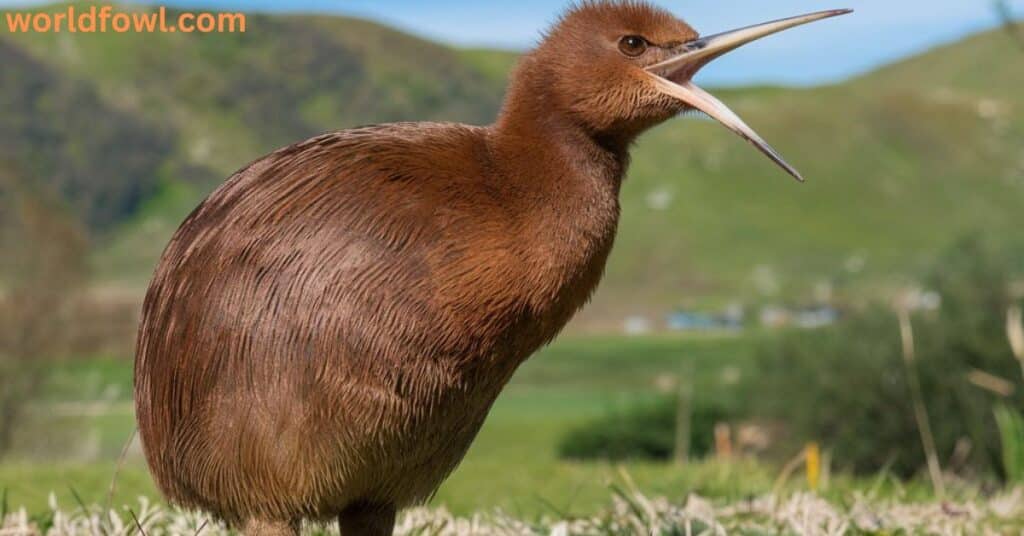
Now that we understand what kiwi birds are, let’s tackle the central question: Do kiwi birds attack humans? The simple and most accurate answer is no. Kiwi birds are not aggressive creatures and do not attack humans. Instead, they tend to be non-aggressive and shy animals that prefer to avoid confrontation.
Are Kiwi Birds Aggressive?
It’s essential to emphasize that kiwi birds are not naturally aggressive. In fact, they are quite the opposite. Kiwi birds are generally shy and defensive creatures that avoid human contact as much as possible. These flightless birds rely on their ability to blend into their environment, using their camouflage to evade predators. Their primary defense mechanism is not to attack, but rather to stay hidden or flee when they feel threatened.
Kiwi birds are not predatory; they feed on small insects, worms, fruits, and berries. They are not territorial in the same way that many other birds are, meaning they don’t feel the need to defend their space aggressively. Instead, they are highly sensitive to disturbances in their environment and are more likely to retreat to their burrows or seek shelter than confront potential threats.
Interaction with Humans
While kiwi birds are typically non-aggressive, it’s important to understand how they behave when they do come into contact with humans. Generally speaking, kiwi birds will avoid humans whenever possible, as they perceive us as a potential threat. If you were to encounter a kiwi in the wild, it would likely attempt to flee rather than confront you. If you startle a kiwi bird or come too close, it may attempt to defend itself briefly, but this usually involves using its sharp beak and claws to escape rather than to fight back.
The more typical interaction between kiwi birds and humans happens in wildlife sanctuaries or conservation areas. In these settings, where kiwi birds are somewhat more accustomed to human presence, the birds might allow for a brief encounter, but they will still likely keep their distance. Conservation efforts and habitat restoration projects are aimed at ensuring that kiwi birds are not unduly disturbed and can live safely in their natural habitats.
See Also : Do Capybaras Attack Humans? The Truth!
Defense Mechanisms of Kiwi Birds
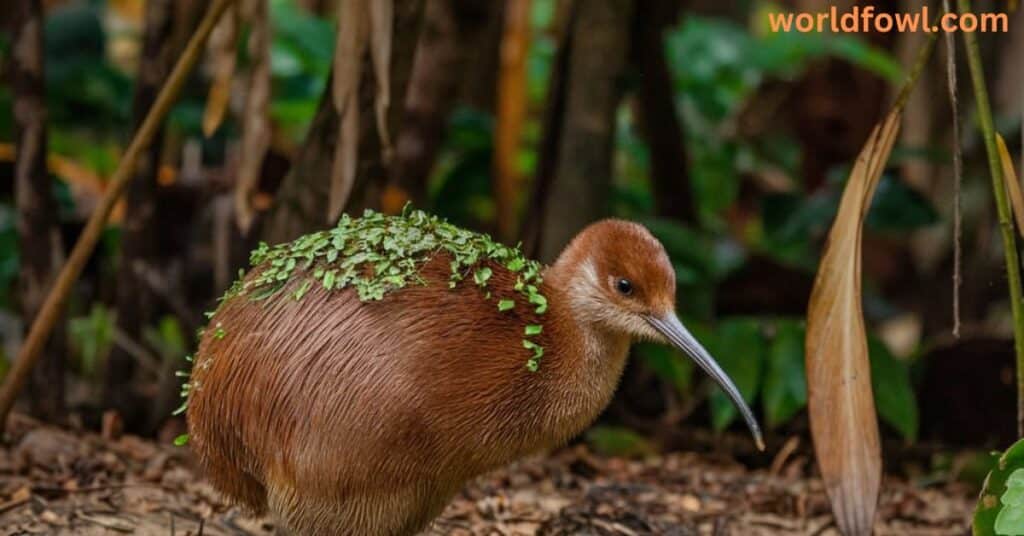
Though kiwi birds are non-aggressive, they have several natural defense mechanisms to protect themselves from predators. These defenses are not intended for use against humans but serve to keep kiwi birds safe from the dangers posed by natural predators in the wild.
Camouflage and Stealth
One of the most important defense mechanisms of the kiwi bird is its ability to blend into its environment. The brown, fibrous feathers of the kiwi bird provide excellent camouflage, making it difficult for predators to spot them in the dense underbrush of New Zealand’s forests. Their small size and the low, ground-level habitat they prefer further increase their chances of evading detection.
Sharp Claws and Beak
Kiwi birds have strong, sharp claws and a long, pointed beak, which they primarily use for foraging. The sharp claws help them dig and search for food in the soil, while the beak is excellent for probing the ground in search of insects. While these physical traits may seem like they could be used in an attack, kiwi birds tend to use them only when they feel cornered or threatened.
However, it’s important to note that kiwi birds will rarely engage in aggressive behavior. In fact, if a kiwi feels threatened by a human, its instinct is more likely to be flight or hiding, rather than standing its ground.
Nocturnal Behavior
Another defense mechanism is their nocturnal lifestyle. By being most active at night, kiwi birds avoid many of the daytime predators, including humans. Their nocturnal habits allow them to remain hidden during the day when they are most vulnerable. This behavior is an essential survival tactic, as it enables the kiwi to stay out of harm’s way and forage for food under the cover of darkness.
See Also : Spiritual Meanings Of A Dog Running Away
Recorded Incidents: Do Kiwi Birds Ever Attack Humans?
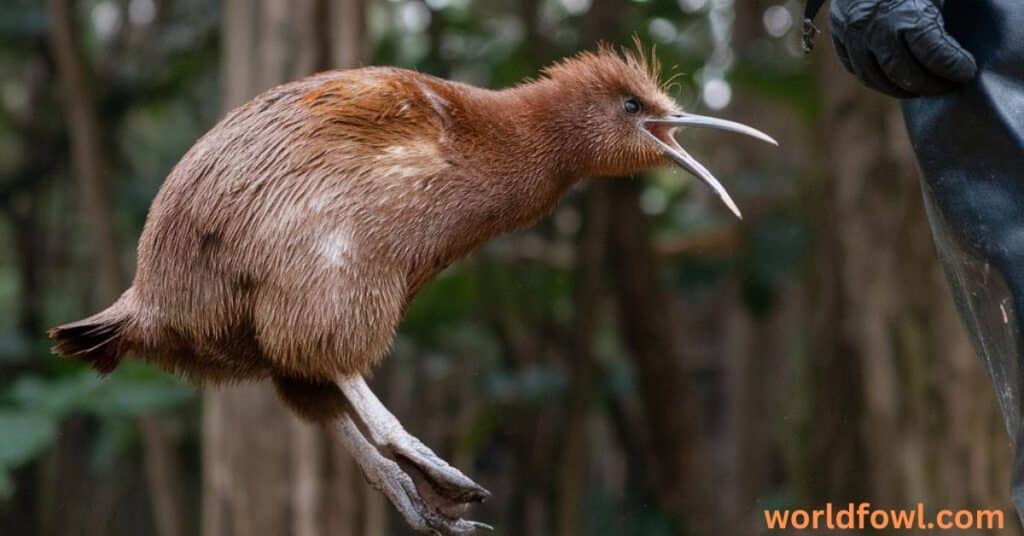
When it comes to incidents of kiwi birds attacking humans, there is very little to report. As we’ve already discussed, kiwi birds are naturally non-aggressive and do not seek out confrontation with humans. In fact, the vast majority of kiwi bird encounters with people occur without incident.
However, there have been a few documented cases of kiwi birds acting defensively, but these are rare and typically involve the bird feeling cornered or threatened. For example, if a kiwi bird is inadvertently disturbed in its nest or burrow, it might attempt to scratch or peck at the perceived threat as a last resort. These reactions are purely defensive and not part of the bird’s usual behavior.
It’s also important to remember that kiwi birds are under threat from introduced predators, such as rats and stoats, which have contributed to their endangered status. As a result, kiwi birds may be more sensitive to perceived threats from other animals and humans due to their heightened survival instincts.
Misunderstandings and Myths About Kiwi Birds
There are many kiwi bird myths that contribute to misunderstandings about their behavior. Let’s take a closer look at some of the most common misconceptions:
Myth 1: Kiwi Birds Are Aggressive
This is a significant myth that often causes people to fear kiwi birds. In reality, kiwi birds are shy and non-aggressive. They are not territorial or inclined to attack unless they feel absolutely threatened, and even then, they are more likely to run or hide rather than fight.
Myth 2: Kiwi Birds Will Attack Humans
Kiwi birds do not attack humans. They may react defensively if surprised or cornered, but they do not seek out human confrontation. As we’ve mentioned, they rely on their ability to remain hidden and to flee from danger when possible.
Myth 3: Kiwi Birds Can Be Tamed
Another misconception is that kiwi birds can be domesticated or tamed. While they can be observed in wildlife sanctuaries in New Zealand, they are still wild animals with instincts and behaviors that are not suitable for domestication. Kiwi birds are best left in their natural habitat, where they can thrive.
Why Are Kiwi Birds Important?
Kiwi birds are not just fascinating creatures—they also play a critical role in New Zealand’s ecosystem. Despite their shy nature, they have a significant impact on their environment.
Ecological Role
Kiwi birds are responsible for soil aeration and seed dispersal. As they forage for food, they dig into the soil, helping to aerate it and improve its health. This process is crucial for maintaining the ecosystem, as it encourages plant growth and keeps the soil fertile. Kiwi birds are also important for spreading the seeds of native plants, helping to maintain biodiversity across New Zealand’s forests and grasslands.
Conservation Efforts
Kiwi birds are currently an endangered species, with only a few species of kiwi left in the wild. Conservation efforts are vital for ensuring their survival. Programs aimed at predator control, habitat restoration, and wildlife conservation have been launched to protect these unique birds. New Zealand’s wildlife sanctuaries play an essential role in providing safe havens for kiwi birds, helping to ensure that they can continue to thrive.
See Also : Flightless Bird Species of New Zealand – The Complete Guide
How to Interact Safely with Kiwi Birds
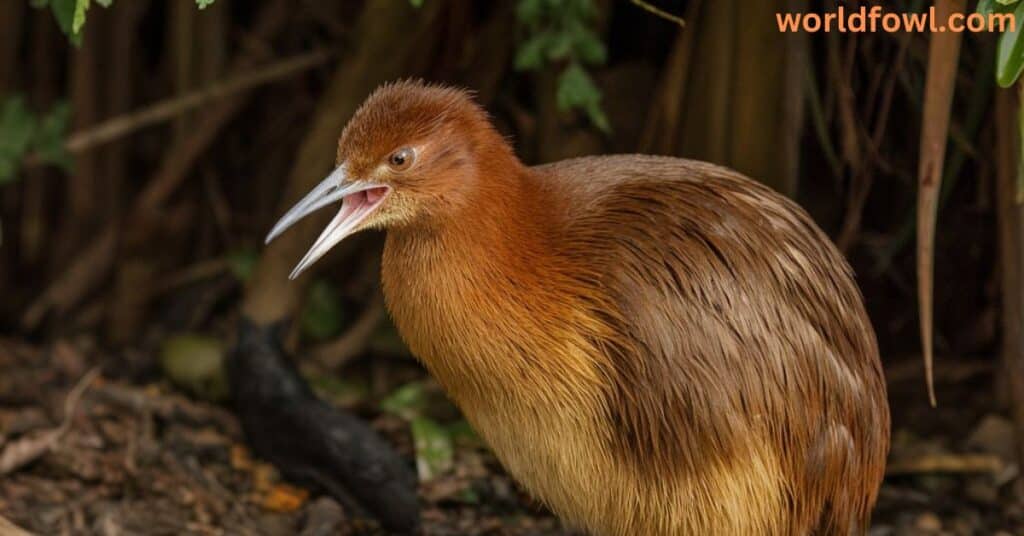
If you’re lucky enough to encounter a kiwi bird, it’s important to interact with it respectfully and safely. Here are some guidelines for wildlife enthusiasts who want to observe kiwi birds in their natural habitat:
Guidelines for Interaction
- Keep Your Distance: Kiwi birds are shy and should not be approached too closely. Give them plenty of space to move around without feeling threatened.
- Be Quiet: Avoid making loud noises or sudden movements that might scare the bird. Kiwi birds are sensitive to noise and will likely flee if they feel startled.
- Observe at Night: Since kiwi birds are nocturnal, the best time to see them is at night. Make sure to use a red flashlight, as bright lights can disturb them.
- Respect Wildlife Sanctuaries: If you’re visiting a wildlife sanctuary or conservation area, follow the rules and respect the bird’s natural environment. These areas are designated to protect the birds, so it’s important to minimize your impact.
Final Verdict: Do Kiwi Birds Attack Humans?
After examining the behavior, defense mechanisms, and interactions of kiwi birds, it’s clear that these birds are not aggressive and do not attack humans. Kiwi birds are shy, elusive creatures that rely on camouflage, nocturnal behavior, and fleeing to avoid danger. While they may defend themselves if threatened, they are non-aggressive by nature.
Kiwi birds are an important part of New Zealand’s ecosystem, and their conservation is critical to maintaining the biodiversity of the region. Understanding their behavior and respecting their need for space will ensure that future generations can continue to enjoy the wonder of these fascinating birds.
See Also : How Do Penguins Mate? The Complete Guide To Penguin Love
FAQs
Are kiwi birds dangerous to pets? Kiwi birds are generally not dangerous to pets, but they should not be disturbed. Pet owners should ensure that their pets do not disturb kiwi birds, especially in conservation areas.
Can you keep a kiwi bird as a pet? No, kiwi birds cannot be kept as pets. They are wild animals that require specific environments to survive, and their conservation status prohibits domestication.
Why are kiwi birds so shy? Kiwi birds are shy due to their evolutionary history as flightless birds. They rely on camouflage and stealth to avoid predators, which makes them naturally timid around humans.
What should I do if I see a kiwi bird? If you encounter a kiwi bird, enjoy the sight from a safe distance without disturbing it. Avoid sudden movements or loud noises.
Are kiwi birds endangered? Yes, kiwi birds are endangered due to habitat loss, predation by introduced species, and other environmental factors. Conservation efforts are critical to protecting them.
Conclusion
In conclusion, kiwi birds are fascinating, unique creatures that are an integral part of New Zealand’s natural heritage. While they may be shy and non-aggressive, they do not pose any threat to humans. Understanding their behavior, respecting their space, and supporting wildlife conservation efforts are key to ensuring that future generations can continue to enjoy the wonders of these remarkable birds.

Henry James is a seasoned blogger and a passionate storyteller on “World Fowl.” With years of experience crafting engaging content, he brings a unique blend of expertise and creativity to his writing. Henry specializes in exploring diverse topics with depth and clarity, captivating readers worldwide.

